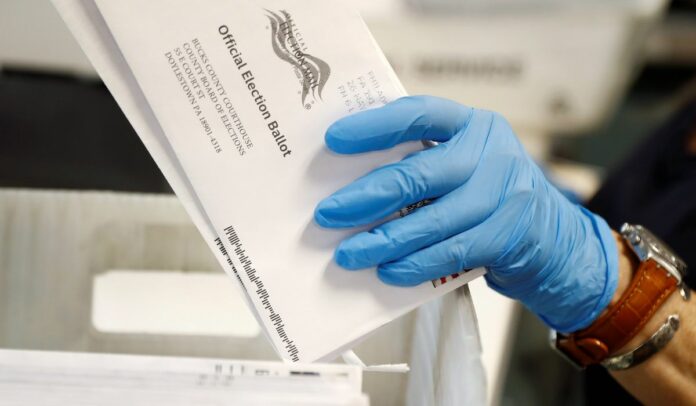PHILADELPHIA — Devyn Smith won’t let the coronavirus or a ballot arriving in her mailbox keep her from showing up in person at the polling station to cast her vote for Democratic presidential nominee Joseph R. Biden.
Ms. Smith, a 28-year-old Black woman who works as a teller at a credit union, said going to the polls is more convenient and not any riskier than her everyday activities.
“I work in front of the public all day, every day,” she said.
While President Trump and top Democrats snipe over mail-in voting, the reality is that most voters, even in states that host “all mail” elections, will cast ballots in person like Ms. Smith.
What sets all-mail states apart is that they send a ballot to every registered voter with the option to send it back by post. But in Colorado, an all-mail state, 73% voted in person in 2016. So did 65% of Washington state residents and 59% of Oregonians, who were the first to adopt the system.
Fears of COVID-19 may make a dent in in-person numbers, but polls show most voters still plan to show up in person.
In Pennsylvania, a state considered key to the outcome of the presidential election, 62% of registered voters plan to vote in person for the presidential election, according to a Franklin & Marshall College Poll released in late August.
Democrats are more eager about mail: 52% said they will post their ballots. Among Republicans, 84% said they will show up in person.
Part of that appears to be a backlash against Democrats’ warnings that the coronavirus will zap voting in person.
Retired salesman John Gormley, 68, a registered Republican and Trump supporter in the Philadelphia suburbs, said calls for more mail-in voting were “a bunch of hype and nonsense.”
“I do believe in COVID. I know people that have been affected with it,” he said. “But if you can come out and get ice cream or go to a grocery store or go shopping anywhere else, all the rest of it is, frankly, just a bunch of nonsense.”
An NBC News/Wall Street Journal poll found just 30% of voters nationwide plan to vote by mail and 63% plan to vote in person. Of those, 20% said they will go to the polls during early voting and 43% said they will cast ballots in person on Election Day.
Nearly half of Mr. Biden’s supporters said they would vote by mail, and two-thirds of Mr. Trump’s supporters plan to vote in person, according to the survey.
Election experts say that known instances of voter fraud are relatively rare, but the chances of fraud when a ballot is mailed automatically to every voter rather than by request does create more opportunities for skullduggery. Voting on behalf of someone else or changing a vote is easier in the privacy of a home than in a polling booth.
Some states have canceled witness signature requirements to fight the spread of the coronavirus, opening still more opportunities for mischief.
An even bigger danger is the invalidation of ballots. Mailed ballots must be signed correctly, or else they are flagged. In Colorado, the secretary of state’s own daughter reportedly had her ballot rejected initially because of an error.
Voters are usually given a chance to fix the problem, but hundreds of thousands of people don’t have that opportunity and aren’t aware that their ballots aren’t counted. Studies suggest ballots from minority and younger voters are canceled at higher rates.
Mr. Trump is mounting legal battles against states rushing to adopt vote-by-mail systems.
The Trump campaign and the Republican Party last month sued Nevada over its mail-in voting plan and filed a similar lawsuit this week against Montana after Gov. Steve Bullock, a Democrat, gave counties the choice of conducting the November election by mail because of the COVID-19 pandemic.
Mr. Trump’s campaign also sued Pennsylvania over its botched mail-in primary election in June. The lawsuit argues that a flood of mail-in ballots would jeopardize the integrity of the November election.
Ballot requests soared for the primaries, but slow mail service delayed results for weeks and thousands of votes were left uncounted.
Pennsylvania was one of three key states Mr. Trump flipped in 2016 to help him win the White House. The state is expected to be ground zero this year.
Under the Constitution, states set their own rules for elections. Standards for early voting and the types of machines used to record ballots vary widely.
“We don’t know how all of these different states are going to react to mail-in voting,” said Kenneth Warren, a political science professor at St. Louis University.
He noted that the coronavirus could increase COVID-19 cases this fall, possibly leading to more mail-in voting than suggested in August polling.
Because of requirements to check signatures, secure witnesses and get qualifying postmarks on mail-in ballots, Mr. Warren said, the election outcome could not be known well beyond Nov. 3.
Mr. Trump likely will appear to be the winner in early tabulations because his voters are more likely to show up in person. Once all mail-in votes are tabulated, the results could change in Mr. Biden’s favor, he said.
“Can you imagine the turmoil that would cause?” he said.
• Alex Swoyer reported from Washington.






